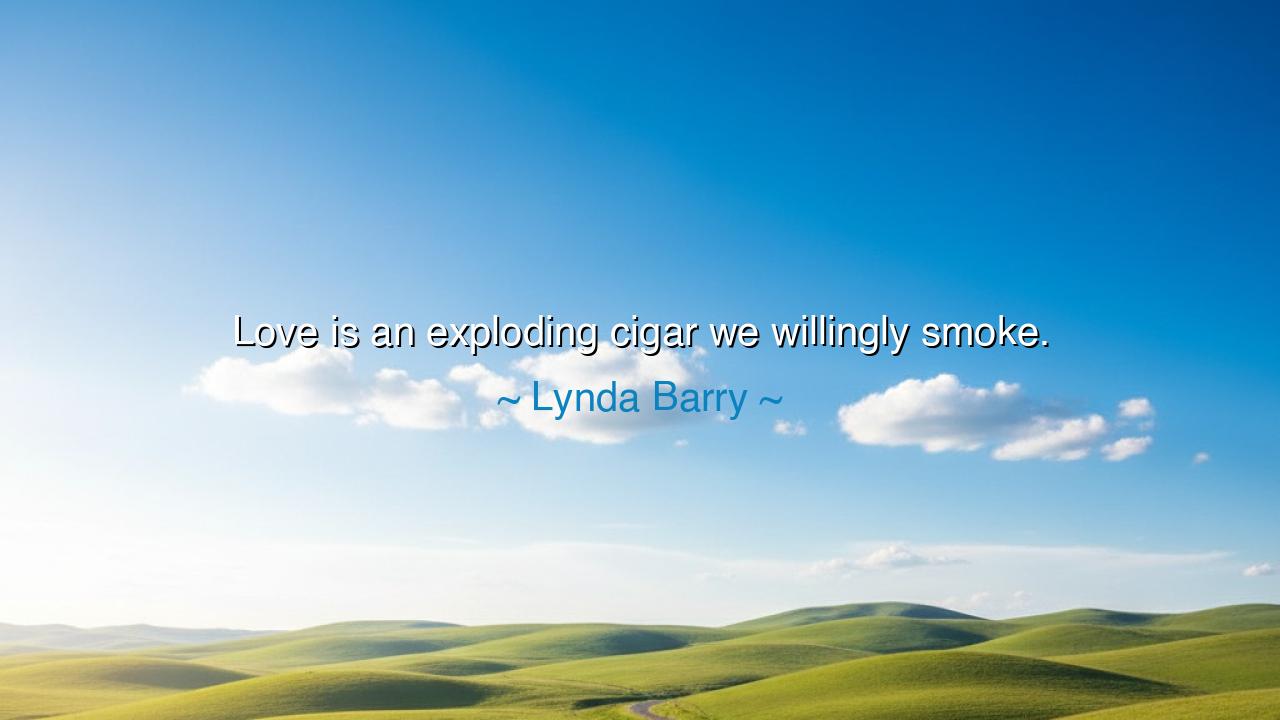
Love is an exploding cigar we willingly smoke.






“Love is an exploding cigar we willingly smoke,” wrote Lynda Barry, the artist and storyteller whose wit hides great wisdom beneath its laughter. In this vivid and mischievous image, she reveals a truth both humorous and profound — that love, for all its sweetness, is never without danger. It is a pleasure that carries risk, a joy entwined with pain. To love is to take into one’s hands something beautiful and burning, knowing that it might, at any moment, explode and wound the very heart that cherishes it. Yet, despite knowing this truth, we return to love again and again, willingly, as though the risk itself were part of its beauty.
The origin of this quote arises from Barry’s deep understanding of human nature, forged through years of storytelling, art, and observation. Known for her honesty about the absurdities of life, she saw that love cannot be tamed into something safe. It is wild, unpredictable, and alive — the same force that brings delight can also bring despair. But Barry does not speak in cynicism. Her words are playful, even affectionate. The “exploding cigar” is not a symbol of betrayal or doom, but of surprise — the unpredictable element that gives love its power. To “willingly smoke” it is to accept that love, like life itself, cannot be lived without vulnerability.
When Barry calls love an exploding cigar, she reminds us that no one escapes love unscathed. To love is to surrender control. It is to let another person enter the fragile chambers of your heart, where they may either plant flowers or strike a match. Yet this very danger is what makes love sacred. The ancients knew this well — from Eros, who shot arrows that both wounded and awakened, to the poets of every age who spoke of love’s madness and miracle. Love, in its essence, is the union of pleasure and peril, the divine paradox that defines the human soul.
History, too, gives us countless mirrors of this truth. Consider the story of Antony and Cleopatra, two rulers whose love was as fierce as their ambition. Their passion united two empires, but it also led to their fall. They knew the risks — the political ruin, the scandal, the destruction — and yet they chose to love openly, defiantly, as though the explosion itself were worth the fire. Their story endures not because of their downfall, but because they dared to love with the full knowledge that it could destroy them. In this, they embody Barry’s wisdom: the willingness to love despite the inevitable pain it brings.
Yet Barry’s quote is not a tragedy — it is a celebration of courage. For to “willingly smoke” love’s cigar is to live fully awake. The timid heart may avoid love and thus avoid pain, but it also avoids life. Love, even when it breaks us, enlarges us. It teaches us tenderness, humility, and strength. The one who has loved deeply, even if burned, walks with a kind of light that those untouched by passion cannot know. The scars of love are the mark of having lived — proof that the heart was brave enough to feel.
Barry’s humor, sharp as it is, hides deep compassion. She knows that the very explosion we fear is the same force that shapes us. Love, when it shatters, teaches us resilience; when it flourishes, it teaches us grace. It is the great teacher of the human soul. To refuse it out of fear is to remain untested, untransformed. But to accept it — to light the cigar with trembling hands and a fearless heart — is to join the timeless dance of all who have ever dared to love.
So, dear listener, what lesson can we draw from Lynda Barry’s strange and beautiful metaphor? It is this: do not fear the explosion — fear only never having lit the flame. Love boldly, even knowing it may hurt. Give yourself without measure, not because it is safe, but because it is real. Every moment of love, no matter how brief, is worth the risk. For it is better to be scarred by passion than hollow from caution.
And when love does explode — when it burns and leaves its mark — do not curse it. Smile through the smoke, knowing you have tasted the fire that animates all of life. For in that surrender, in that reckless willingness to love despite the cost, you have touched eternity. That, as Lynda Barry reminds us, is the glorious foolishness of the human heart: that it knows the danger, yet loves anyway — and in that defiance, becomes divine.






AAdministratorAdministrator
Welcome, honored guests. Please leave a comment, we will respond soon